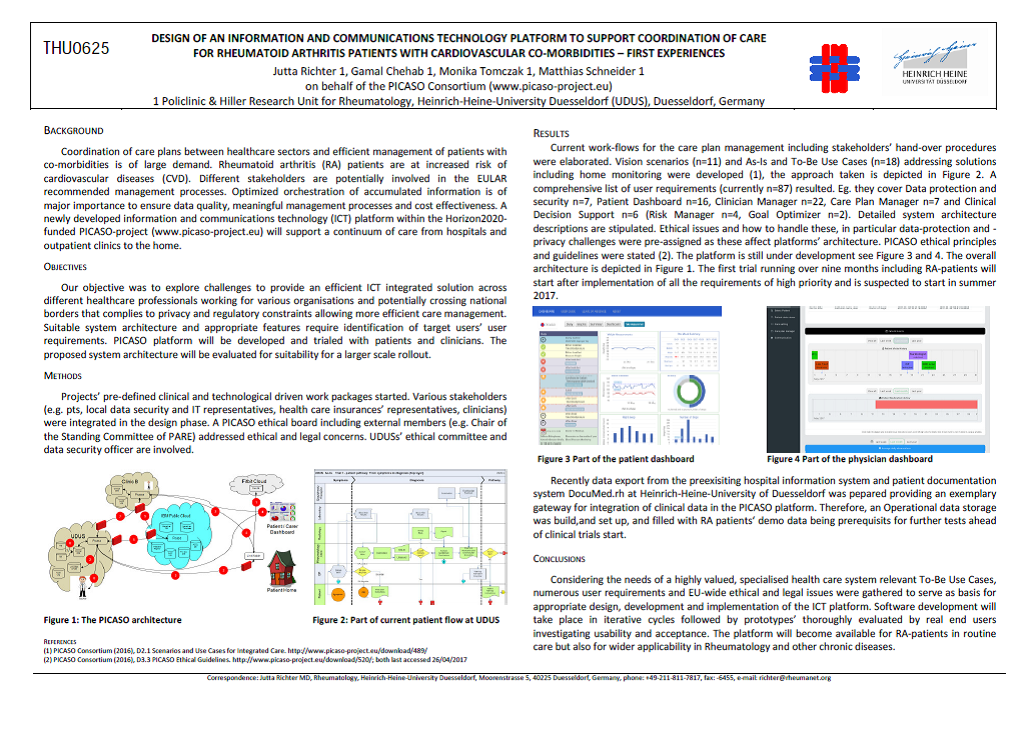The PICASO trial in Germany, run by The Policlinic of Rheumatology & Hiller Research Unit at the Heinrich-Heine University Düsseldorf (UDUS), has been registered with the Deutschen Register Klinischer Studien (DRKS) and has been submitted to WHO. It is now searchable via WHO’s Meta-registry. Search for “A Personalised Integrated Care Approach for Service Organisations and Care Models for Patients with rheumatoid arthritis and cardiovascular comorbidity” at http://apps.who.int/trialsearch/
PICASO at WIKT 2017
Project partner TUK gave a presentation on PICASO at the WIKT – 12th Workshop on Intelligent and Knowledge oriented Technologies 2017. The presentation, entitled “SW platform for heterogeneous health care data integration” was given by Marek Skokan in the first session on 30 November 2017.
The WIKT workshop took place in Kosice, Slovakia, on 30 November – 1 December 2017. See the programme here.
TUK’s presentation is available for download from the knowledge centre.
PICASO at ICCST 2017
PICASO partner INUIT presented the paper “Understanding and granting Android permissions: A user survey” at the 51st International Carnahan Conference on Security Technology (ICCST 2017) on 25th October 2017, in Madrid, Spain. The presentation is available for download via the knowledge centre.
The ICCST paper is titled: “Understanding and granting Android permissions: A user survey”. PICASO representatives from INUIT are co-authors of the paper and have drawn on their experiences from the development of Apps to patients and their informal carers who will participate in the PICASO trials. The paper focuses on how users consider, interpret and react to differences in app permission information which is provided at three different instances of the app installation cycle. This issue is very relevant in the PICASO context as the App for the PICASO home-monitoring solution will transmit patients’ health data to the PICASO platform. Although all patient data in PICASO will be pseudonymised and will otherwise comply with the applicable data protection regulations, it is important from an ethical perspective that users fully understand what the permission entails and why it is necessary.
Christian Schunk, INUIT, presented the paper in Session S6B: Access Control, Wednesday 25 October 2017. The presentation discussed the study described in the paper followed by a presentation of PICASO focusing on the App and home-monitoring components used in the PICASO trials.
Article abstract:
“Whenever users install a new application on their smart devices with an Android KitKat or Lollipop operating system they are asked to grant the application (app) provider access to features of the device, ranging from data storage to device location and from device identity to the users personal contacts. The implications on users’ privacy and security are significant and therefore the users’ ability to give informed consent is highly important. Previous work has identified low rates of user attention and comprehension to permission warnings and concluded that these fail to inform the majority of users. Here we focus on how users consider, interpret and react to differences in app permission information which is provided at three different instances of the app installation cycle: 1. Before installation in the Google Play Store 2. During the installation process 3. After installation in the Application Manager. The information provided in these instances varies considerably in its granularity and detail. For this purpose, an online survey was developed in which users were asked questions regarding the installation of a mirror app whose main functionality is to use the user facing camera of the phone to mirror the users face (i.e. display an image of the face) on the phone’s screen. The survey participants were shown screen shots of the app description as presented in the Android Market store as well as of the various permission lists as they appear on the screen of the phone. The questions focused on the respondents’ perceptions and their hypothetical choices with regard to the installation of this app. Results show that the various presentations of permission information in Android versions KitKat or Lollipop cause concern and irritate a majority (51.67%) of users, especially those with some basic IT expertise. We conclude that the contextualization of app features and functionalities with the corresponding permissions needs to be improved especially for users with little IT expertise. Further user permission information should be made available at different
and consistent levels of granularity.”
The 51st International Carnahan Conference on Security Technology (ICCST 2017) was held from 23-26 October 2017, in Madrid, Spain.
Presentation of the UDUS Trial at the DGRh 45th Congress in Stuttgart, Germany
The UDUS trial was presented at the German Society for Rheumatology (GDRh) 45th Congress in September 2017.
PD Dr. Jutta Richter presented the UDUS trial in the Investigator Initiated Trial (IIT) poster session at the DGRh Congress. The poster presentation, “Design of an Information and Communications Technology Platform to Support Coordination of Care for Rheumatoid Arthritis Patients with Cardiovascular Co-morbidities”, describe the main objectives, challenges and results to date of the PICASO trial run by UDUS. Screen shots of the Patient Dashboard and Clinician Dashboard developed by the PICASO team were illustrated in the poster.
Poster Presentation at EULAR 2017
The PICASO trial run by project partner UDUS was presented at the Annual European Congress of Rheumatology (EULAR) in Madrid, Spain, in June 2017. The poster presentation focused on the experiences and knowledge gained so far in developing the PICASO platform and setting up the UDUS trial. The trial will implement and demonstrate the technical solution developed in the project and it will involve 30 patients with Rheumatoid Arthritis and cardiovascular co-morbidities.
The paper entitled “Design, development and implementation of an information and communications technology platform to support coordination of care for patients with Rheumatoid Arthritis and cardiovascular co-morbidities – first experiences” was presented at EULAR by PD Dr. Jutta Richter, UDUS, Policlinic of Rheumatology.
The presentation abstract is available from the EULAR Abstract Archive here.
Download the EULAR 2017 Poster .

